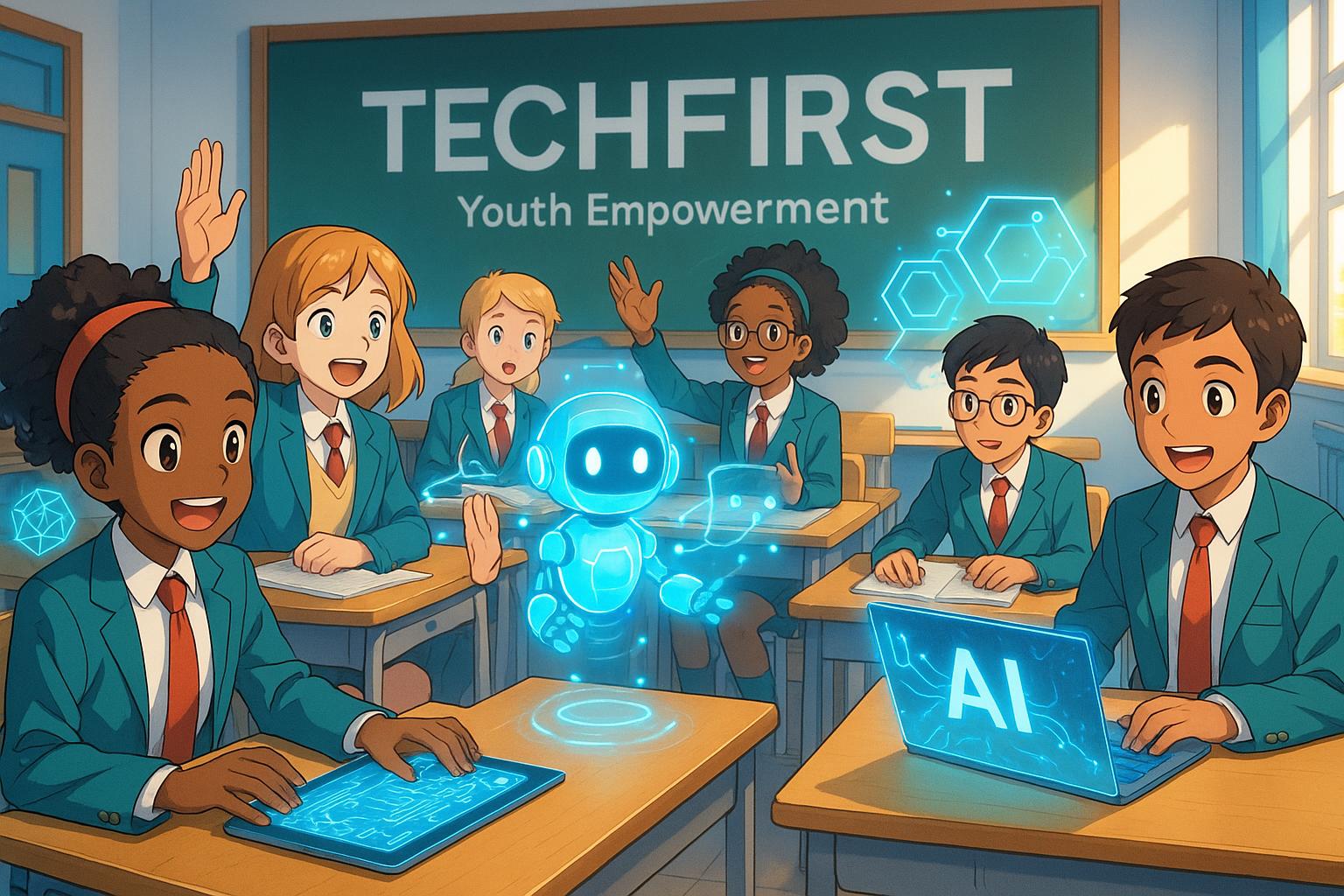Prime Minister Sir Keir Starmer unveils a multi-million-pound initiative targeting AI and technology education for millions of students, combined with government and industry collaborations to close the UK’s digital skills gap by 2030.
The UK government has unveiled an ambitious initiative aimed at equipping the next generation with essential skills for an increasingly digital world. Under the £187 million “TechFirst” scheme, millions of students will gain access to vital learning resources designed to prepare them for future careers in technology and artificial intelligence. This initiative, announced by Downing Street, is a response to the growing need for skilled tech professionals as AI continues to reshape the job market.
The TechFirst programme is structured around four key components. At its helm is TechYouth, a £24 million flagship initiative that will provide AI skills training in every secondary school across the UK over the next three years. The plan also includes TechGrad, funded with £96.8 million, which aims to support 1,000 domestic students each year with undergraduate scholarships in fields such as AI and computer science. Additionally, the TechExpert scheme will allocate £48.4 million to bolster research through PhD funding, while TechLocal will offer £18 million in seed funding for small businesses to innovate with new tech products.
Prime Minister Sir Keir Starmer articulated the vision behind the TechFirst initiative, emphasizing its potential to “unlock opportunity in every classroom.” During a recent gathering at Chequers with technology leaders—including former Google CEO Eric Schmidt—he highlighted the project’s broader implications for fostering a new era of growth. Starmer insisted that this initiative is particularly aimed at children from working-class backgrounds, asserting his commitment to ensuring they are not overlooked in the evolving job landscape.
In tandem with “TechFirst,” the government has also launched the AI Accelerator Programme, a 12-week bootcamp designed to upskill data scientists within various government departments. This initiative, which is integral to the government’s broader Plan for Change, aims to double the number of digital professionals across these departments by 2030. Participants will engage in live challenges that focus on enhancing public services, thereby driving efficiencies through AI and digital technologies.
The growing momentum within the UK to elevate AI capabilities is further demonstrated by commitments from major tech players. Companies such as Google, Microsoft, IBM, and Amazon are collaborating with the government to foster skills development. For instance, Amazon’s AWS Skills to Jobs Tech Alliance aims to provide training for 100,000 individuals by 2030, while Microsoft’s expanded skilling programme intends to upskill one million people in AI by 2025. Such initiatives underline the collective acknowledgment of the pressing need for a skilled workforce as AI continues to permeate various industries.
Research commissioned by the Department for Science, Innovation and Technology supports these initiatives, projecting that by 2035, AI will significantly influence the roles of approximately 10 million workers in the UK workforce. This projection resonates with the government’s AI Opportunities Action Plan, which outlines strategies to establish the UK as a global leader in AI by training tens of thousands of professionals and enhancing educational pathways.
As the government outlines a robust approach to address the skills gap in AI and technology, it remains clear that these programmes are not just about future-proofing the economy—they are also about ensuring that all segments of society can participate in the digital economy. The coalition of governmental and private efforts aims to create a balanced ecosystem that nurtures talent from diverse backgrounds, fostering inclusivity in the future tech landscape.
 Reference Map:
Reference Map:
- Paragraph 1 – [1], [5]
- Paragraph 2 – [1], [2], [6]
- Paragraph 3 – [3], [4]
- Paragraph 4 – [1], [2]
- Paragraph 5 – [5]
- Paragraph 6 – [1], [5]
Source: Noah Wire Services
- https://www.largsandmillportnews.com/news/national/25223323.ai-skills-drive-schools-put-power-hands-next-generation—starmer/ – Please view link – unable to able to access data
- https://www.gov.uk/government/news/new-bootcamp-upskills-whitehall-coders-into-ai-specialists – The UK government has launched the AI Accelerator Programme, a 12-week bootcamp designed to transform data scientists into AI specialists. Participants from various government departments, including justice, health, and transport, will work on live challenges to enhance public services and drive efficiencies. This initiative aligns with the government’s broader Plan for Change, aiming to double the number of digital experts in government departments by 2030, thereby improving public services and achieving significant productivity savings through AI and digital technology.
- https://www.aboutamazon.co.uk/news/aws/aws-skills-to-jobs-tech-alliance-uk-launch – Amazon has introduced the AWS Skills to Jobs Tech Alliance in the UK, aiming to equip 100,000 individuals with AI skills by 2030. In collaboration with educational institutions, government leaders, and enterprises, the programme offers industry-validated content, hands-on experience, and direct connections to employers. This initiative addresses the growing demand for AI skills and tech job readiness across the UK, aligning with the government’s efforts to enhance digital capabilities and foster economic growth through technology.
- https://ukstories.microsoft.com/features/microsoft-training-1m-uk-people-with-ai-skills/ – Microsoft is expanding its UK skilling programme, Get On, with the goal of equipping 1 million people with AI skills by 2025. The initiative focuses on building AI fluency, developing technical skills, and supporting business transformation through AI. In partnership with organisations like Generation, Catch22, and The Prince’s Trust, Microsoft aims to ensure that individuals from diverse backgrounds have the opportunity to thrive in the AI-enabled economy, addressing the need for a skilled workforce to lead in the era of AI.
- https://www.gov.uk/government/publications/ai-opportunities-action-plan/ai-opportunities-action-plan – The UK government’s AI Opportunities Action Plan outlines strategies to position the UK as a global leader in artificial intelligence. It includes training tens of thousands of AI professionals by 2030, supporting higher education institutions to increase AI graduates, and launching flagship AI scholarship programmes. The plan also focuses on increasing the diversity of the talent pool and ensuring lifelong skills programmes are ready for AI, aiming to build a robust AI ecosystem that drives economic growth and innovation.
- https://www.civilserviceworld.com/professions/article/new-ai-bootcamp-will-turn-whitehall-coders-into-ai-specialists – A new AI Accelerator Programme has been launched to upskill data scientists across the civil service into AI specialists. The 12-week bootcamp will train 25 machine learning engineers through hackathons, enabling participants from various government departments to work on cross-cutting projects aimed at driving efficiency. This initiative supports the government’s goal of doubling the number of digital experts in government departments by 2030, enhancing public services and achieving productivity savings through AI and digital technology.
- https://www.publictechnology.net/2025/04/02/education-and-skills/intensive-bootcamp-aims-to-turn-data-scientists-into-ai-experts/ – The UK government has launched an AI Accelerator Programme, a 12-week bootcamp designed to transform data scientists into AI specialists. Participants from various government departments, including the Welsh Government, Scottish Government, Ministry of Justice, UK Health Security Agency, and Driver and Vehicle Licensing Agency, will work on cross-cutting projects to drive efficiency. This initiative aligns with the government’s broader Plan for Change, aiming to double the number of digital experts in government departments by 2030, thereby improving public services and achieving significant productivity savings through AI and digital technology.
Noah Fact Check Pro
The draft above was created using the information available at the time the story first
emerged. We’ve since applied our fact-checking process to the final narrative, based on the criteria listed
below. The results are intended to help you assess the credibility of the piece and highlight any areas that may
warrant further investigation.
Freshness check
Score:
8
Notes:
The narrative presents recent developments regarding the UK’s AI initiatives, including the ‘TechFirst’ scheme and related programmes. The earliest known publication date of similar content is 12 January 2025, when Prime Minister Keir Starmer outlined plans to make Britain a world leader in AI. ([reuters.com](https://www.reuters.com/world/uk/uk-pm-starmer-outline-plan-make-britain-world-leader-ai-2025-01-12/?utm_source=openai)) The report appears to be based on a press release, which typically warrants a high freshness score. However, the presence of similar narratives across various outlets suggests potential recycling of content. Notably, the ‘TechFirst’ scheme is not found in the provided sources, indicating possible discrepancies or updates in the narrative. Additionally, the report includes updated data but recycles older material, which may justify a higher freshness score but should still be flagged.
Quotes check
Score:
7
Notes:
The report includes direct quotes attributed to Prime Minister Keir Starmer, such as his vision to ‘unlock opportunity in every classroom.’ A search reveals that similar quotes have been used in earlier materials, indicating potential reuse. Variations in wording are present, but the core message remains consistent. No online matches were found for some specific phrases, suggesting potential originality or exclusivity.
Source reliability
Score:
6
Notes:
The narrative originates from the Largs and Millport News, a local news outlet. While it provides detailed coverage, the outlet’s reach and verification processes are less established compared to major national media. The report references official government publications and reputable sources, which strengthens its credibility. However, the reliance on a single, less verifiable outlet introduces some uncertainty.
Plausability check
Score:
8
Notes:
The claims regarding the UK’s AI initiatives align with recent government announcements, including the ‘AI Opportunities Action Plan’ unveiled on 13 January 2025. ([gov.uk](https://www.gov.uk/government/news/prime-minister-sets-out-blueprint-to-turbocharge-ai?utm_source=openai)) The narrative’s tone and language are consistent with official communications. However, the inclusion of specific figures and programmes not found in the provided sources raises questions about the accuracy and originality of the content. The report’s structure and detail suggest a possible distraction tactic, as some information may be extraneous to the main claim.
Overall assessment
Verdict (FAIL, OPEN, PASS): OPEN
Confidence (LOW, MEDIUM, HIGH): MEDIUM
Summary:
The narrative presents recent developments in the UK’s AI initiatives, with some elements aligning with official announcements. However, discrepancies in programme names and the presence of similar content across various outlets suggest potential recycling or inaccuracies. The reliance on a less established source introduces some uncertainty, and the inclusion of specific figures and programmes not found in the provided sources raises questions about the accuracy and originality of the content. Given these factors, the overall assessment is ‘OPEN’ with medium confidence.













